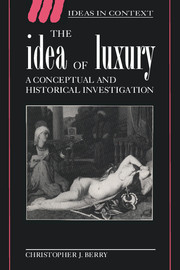6 - The eighteenth-century debate
Published online by Cambridge University Press: 01 June 2011
Summary
The eighteenth century was the period when the debate as to the meaning and value-laden status of luxury came into prominence. The ‘de-moralisation’ undertaken by Barbon as part of his limited and polemical aims was pursued more directly by others and the increasing publicity for this view (especially following Mandeville's contribution) produced, in reaction, a re-vindication of the traditional, moralist – whether humanist or Christian – view. It is important testimony to the salience and implicit seriousness of this debate that it was taken up and pursued throughout the world of letters from St Petersburg to Boston, from Naples to Aberdeen.
The sheer size of the literature makes a comprehensive survey impossible but since any such survey would reveal enormous duplication, it would of itself serve little purpose. Accordingly my strategy in this chapter is to concentrate on Hume and, especially, Smith. It would, however, be untrue to the debate to ignore its breadth of expression and reiterative quality. Additionally, of course, the comprehension of Hume (section iii) and Smith's (section iv) own contribution is bound up with an appreciation of the general debate. To that end, therefore, the first section of the chapter will examine briefly Mandeville's historically key presentation. This will be followed (section ii) by noting, again cursorily, the diffusion of ‘his’ ideas, especially in France, and a concluding section (v) will acknowledge the ‘popular’ dimension of the debate.
- Type
- Chapter
- Information
- The Idea of LuxuryA Conceptual and Historical Investigation, pp. 126 - 176Publisher: Cambridge University PressPrint publication year: 1994
- 2
- Cited by

